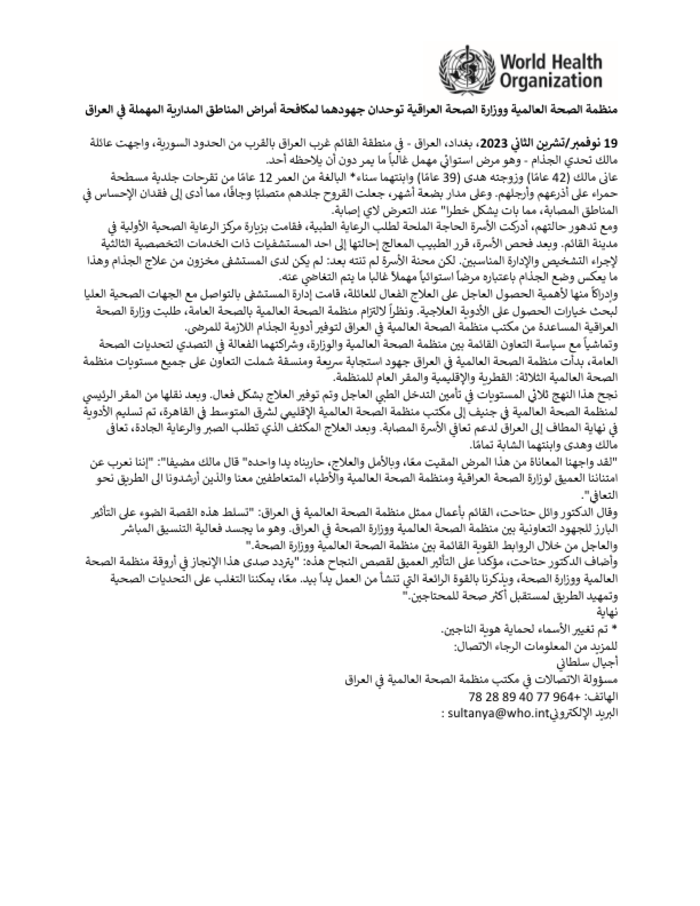
19 November 2023, Baghdad, Iraq – In the remote district of Qaem, in western Iraq near the Syrian border, a family faced the challenge of leprosy – a neglected tropical disease that often goes unnoticed.
Malik (aged 42 years), his wife Huda (aged 39 years) and their 12-year-old daughter Sana* began to experience flat, red skin sores on their arms and legs. Over the course of a few months, the sores made their skin stiff and dry, leading to loss of sensation in the affected areas, which put the family at risk of injury.
As their condition worsened, the family realized the urgent need to seek medical attention, and visited the primary health care centre in Qaem city. After examining the family, the facility doctor decided to refer them to a tertiary-level hospital for proper diagnosis and management. But the family’s ordeal was far from over: the hospital had no stock of leprosy treatment available. This reflects leprosy’s status as a neglected tropical disease that is often overlooked.
Knowing the importance of quickly obtaining effective treatment for the family, the hospital management contacted the higher health authorities to explore options to acquire the treatment drugs. Given WHO’s commitment to global health, the Ministry of Health requested the assistance of the WHO Country Office in Iraq to procure the required leprosy medications for the patients.
In line with the existing cooperation policy between WHO and the Ministry, and their impactful partnership in addressing public health challenges, WHO Iraq initiated a swift and well-coordinated response effort. The collaboration spanned all 3 levels of WHO: country, regional and global.
This 3-tiered approach succeeded in securing urgent medical intervention and the treatment was effectively procured. After being transported from WHO headquarters to the WHO Regional Office for the Eastern Mediterranean, the medications were ultimately delivered to Iraq to support the family’s recovery. Following the extensive treatment, which demanded patience and diligent care, Malik, Huda and their adolescent daughter have fully recovered.
“We faced leprosy together, and with hope and treatment, we fought it as one. Our heartfelt gratitude extends to the Ministry of Health, WHO and the compassionate doctors who guided us on our path to recovery,” said Malik.
Dr Wael Hatahit, Acting WHO Representative in Iraq, said: “This story highlights the compelling impact of collaborative efforts between WHO and the Ministry of Health in Iraq. It exemplifies the effectiveness of seamless cooperation and the robust connections established between WHO and the Ministry of Health.”
Stressing the profound impact of such success stories, Dr Hatahit added: “This achievement resonates in the corridors of WHO and the Ministry of Health, reminding us of the remarkable strength that emerges from working hand in hand. Together, we can overcome health challenges and pave the way for healthier futures for those in need.”
- Names changed to protect identity.
For more information, contact:
Ajyal Sultany, Communications Officer, WHO Iraq Country Office
Telephone: +964 77 40 89 28 78
Email: [email protected]
